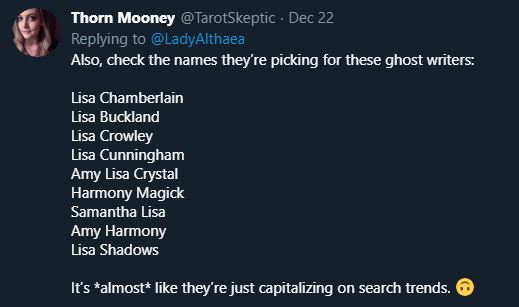ASHEVILLE, North Carolina – A recent tweet by author Thorn Mooney caught the attention of TWH staff. Mooney was exposing an ethically-questionable publishing strategy that capitalizes upon the brands of well-known authors by presenting similar products using similar author names and book titles.

We reached out to Mooney for a comment on the post and publishing and here is what she had to say:
It’s discouraging to know that newcomers have to wade through specially promoted ghost-written books with minimal or incorrect information in order to find credible resources. Especially when these house names come with fabricated biographies. My advice is to look to the people who are out in the community, speaking at events, producing content on social media, teaching through shops, leading groups, and otherwise actively engaging in the public eye. You don’t need to only read big names (in fact, you shouldn’t), but you should be looking for people who are somehow accountable for their content within their communities.
I don’t trust bestseller lists, because we live in a climate where, with the right marketing team and enough resources, bestselling authors can be manufactured. Having worked in book stores and in publishing, I can tell you that sometimes “bestsellers” are chosen for you before they’re even printed. We can only buy what’s presented to us, and that’s often a highly calculated process.
Just look what comes up with a quick search for bestselling witchcraft titles on Amazon: Lisa Chamberlain, Lisa Buckland, Lisa Crowley, Lisa Cunningham. Are we supposed to believe it’s a coincidence that these people share the same first name and the surnames of prominent occult authors? Are we supposed to believe that these people are experts in Wicca, tarot, runes, crystals, and the dozens of other things that they’re churning out books about, all simultaneously?
It certainly seemed curious that there should be so many writers bearing the name “Lisa” publishing books, and most of them with a focus on Wicca. While a mild amount of digging produced a variety of published works relating to Wicca, with the exception of Lisa Chamberlain, none of these authors have any social media presence, no websites, even their books don’t have web pages.
One other thing that stood out, was that nearly all of the books by authors listed above is that the books listed the publisher as: “Independently published.” Books published under the “Chamberlain” name were either listed as being independently published using “CreateSpace” (a print-on-demand, and self-publishing service owned by Amazon) or under Chamberlain Publications or with (Wicca Shorts) added to the name.
While the Amazon service is used by reputable publishers, a web search produced no websites or information for either Chamberlain Publications or Wicca Shorts.
There is a Facebook page for Lisa Chamberlain, author and connects with the website, Wicca Living. The facebook page has 57 likes, and 60 followers, both unusually low numbers for an author who has published over 20 books.
Mat Auryn, a well-known Witch and author, has retweeted Mooney’s post and shared it on Facebook, so TWH asked him what he thought, and he said:
These are some of the names dominating the Amazon charts right now, but it’s so obvious that they aren’t real people if you just take a second to look at them. The formula for the ghostwriter names tend to be the first name of a popular witchcraft author and the last name of a bestselling occult author of all time.
Essentially, they’re playing for the amazon algorithms based on what people would search for, providing small books that are essentially plagiarized versions of classic beginner’s books for next to nothing. The people I know who were approached by this publisher to ghost write, essentially said that they’re looking for witch ghost writers, as the current ghost writers aren’t.
Technically, a ghostwriter is someone who writes a book that someone else will take credit as being the author. Celebrities are perhaps most recognized for employing this tactic, but often professionals and others who wish to communicate an idea and do not feel they have the necessary writing skills will hire a ghostwriter.
One thing is for sure, all of the names Mooney listed in her tweet were either similar to someone who is well-known for their magical works, or in the case of the author, Amy Harmony’s The Green Witch Herbal is similar to both Amy Blackthorn’s Blackthorn’s Botanical Magic: The Green Witch’s Guide to Essential Oils for Spellcraft, Ritual & Healing and Arin Murphy-Hiscock’s The Green Witch: Your Complete Guide to the Natural Magic of Herbs, Flowers, Essential Oils, and More.

Auryn also brought up another issue:
When I was going through the editing process of my book Psychic Witch, a non-occult publisher I hadn’t heard of reached out to me. They asked me if I would be willing to take a fairly large sum of money to write a book using my name under their direction.
The caveat was that I would receive no royalties on the book itself.
They already had the book mapped out and wanted me to essentially paint by their numbers. They had everything detailed, from chapters to points to touch upon.
Since there isn’t a lot of money made by publishing occult books, I can see how this is really tempting to both those who are trying to get their writing out there and make a name for themselves, and also established writers who might want a quick sum of money in a field that isn’t anywhere as lucrative as people seem to think. I myself was tempted for a hot second, but the integrity of my own writing, voice, and work, doesn’t have a price tag on it. So obviously, I declined.
I did further research on this publishing company and was shocked to see that even people I knew who had a large social following were writing for, or being offered to write for this publisher. Poking around with different author friends, I found that this publishing company was essentially a “mask” for another publishing company and had even smaller “mask” publishing name where people were being approached and asked to ghost write under similar offers.
TWH spoke with a popular writer who has worked with a publisher who operates in a similar way as what Auryn outlined. Though they opted to not be identified, they did say it worked out well for them and the publisher was easy to work with.
Unfortunately, in addition to receiving no royalties, they also do not own the rights for their work. The National Writer’s Union’s publication: Guide to Book Contracts outlines clearly how this type of “works for hire,” also called “works made for hire” is applicable only in two ways as dictated by U.S. copyright law. The first is when the person doing the writing is an employee of the company whose job it is to write works to published for the company. The second is a commissioned work that meets at least one of the following criteria:
The work must fall into one of the following nine categories:
- A contribution to a collective work (like an anthology*)
- A part of a motion picture or other audiovisual work
- A translation
- A supplementary work
- A compilation
- An instructional text
- A test
- Answer material for a test
- An atlas
*Contributors to anthologies often relinquish their copyright because of editorial involvement or pressure, but there is no reason to do so. Contributors can retain the copyright on their contribution, while the editor can register a copyright on the entire volume as a collective work.
When it comes to what has been published, and how to choose from what is available, Mooney offered some advice:
“Never forget that publishing is a business, like any other. Even the most well-established and respected houses are not there out of charity. Hopefully they’re striving to do right by the practitioners that rely on them, but if a book doesn’t sell, it won’t stay in print long, no matter how solid and necessary the content.
Mooney added, “Being in a book doesn’t mean that the information is the best available; it means that someone thought there was a market for it. Readers need to be discerning, to read widely, and to engage with all texts critically, regardless of who writes them and who popularizes them.”
The Wild Hunt is not responsible for links to external content.
To join a conversation on this post:
Visit our The Wild Hunt subreddit! Point your favorite browser to https://www.reddit.com/r/The_Wild_Hunt_News/, then click “JOIN”. Make sure to click the bell, too, to be notified of new articles posted to our subreddit.
